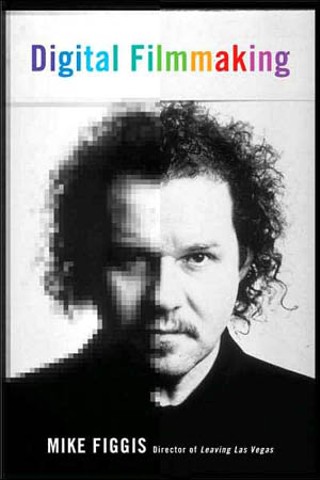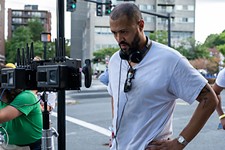Mike Figgis
Digital Filmmaking
Reviewed by Spencer Parsons, Fri., June 8, 2007

Digital Filmmaking
by Mike Figgis
Faber and Faber, 158 pp., $13 (paper)
I can't help thinking that of all the (white) directors in the world who would be detained at customs for saying his business in America was to "shoot a pilot," it would have to be Mike Figgis. My apologies to the man for leading with this embarrassing urban legend in a review of his new book, but the particular forcefulness of his address – direct and sharp, often just short of pugnacious – makes me want to believe this spurious item about a travel mishap in the age of terror. He just strikes me as a bit frightening, whether to the hapless production assistant or the easily confused customs officer who thinks guns and guys who fly airplanes where he should think cameras and television shows.Of course I've never met him. In person, I'm sure he's a pussycat. But on the cover of Digital Filmmaking, half obscured by a digital mosaic pattern, Figgis stares into us like the scariest professor in the film department, the one whose classes begin at 8am and who loudly ejects the tardy. The one alleged to have been politely asked not to throw chairs during critique sessions and who reportedly reduces past and future Student Academy Award winners to tears. You know the guy, the one who many students speak of in hushed tones as the best teacher they ever had.
Inside, he writes a bit like that guy and even provides a gripping anecdote or two about dressing down crew members who didn't treat the camera with adequate respect, by way of impressing the class with his seriousness. Balancing an enthusiasm for the possibilities of the technology with an admirably old-fashioned sense of technical rigor and a "no excuses" policy for why you haven't made your film yet, Figgis might actually be the ideal instructor for digital filmmaking. Certainly his own filmography does not lack for experimentation with both process and surface aesthetics (though I confess I often tend to like the idea of a movie like Timecode better than I like watching it) or for solid comparative experience with more traditional filmmaking.
And thankfully, he never bogs down in wonkiness or tech-speak, perhaps in part from an awareness that technological changes will render his lectures obsolete if he spends time on menu settings or file codecs. On a practical level, he's as keenly aware of the new labor and disciplines that the technology imposes as he is of the time it saves and the crew positions it eliminates, while on a more personal level, he can be impressively passionate about how nothing – not cameras nor money nor professional standards, not even traditional notions of cinematic beauty or storytelling grammar – should get in the way of telling your story. If he can be a little too personal and digressive at times, give him a few semesters, and his own severity will surely tighten and intensify his lectures. But in the meantime, don't be afraid. Take his class.










